Top 10 best soccer players in Argentina of all time
As one of the biggest football teams in South America and the world, the Argentine Football Association (AFA) has produced some of the finest players ever to grace the sport. For fans of the beautiful game, there has always been a debate over who is the greatest: Messi or Maradona. Instead of delving into that issue, let’s take a look at the 10 best soccer players in Argentina of all time, with premiumsoccertips.net.
Best Argentina Soccer Players of All Time
10. Ángel Di María
Ángel Di María isn’t a controversial choice when considering his successes for both club and national team. Nicknamed “Fideo” (Spanish for “Noodle”) due to his slender appearance, Di María combines technical attributes such as dribbling, passing, and creativity with athletic traits like speed and endurance.
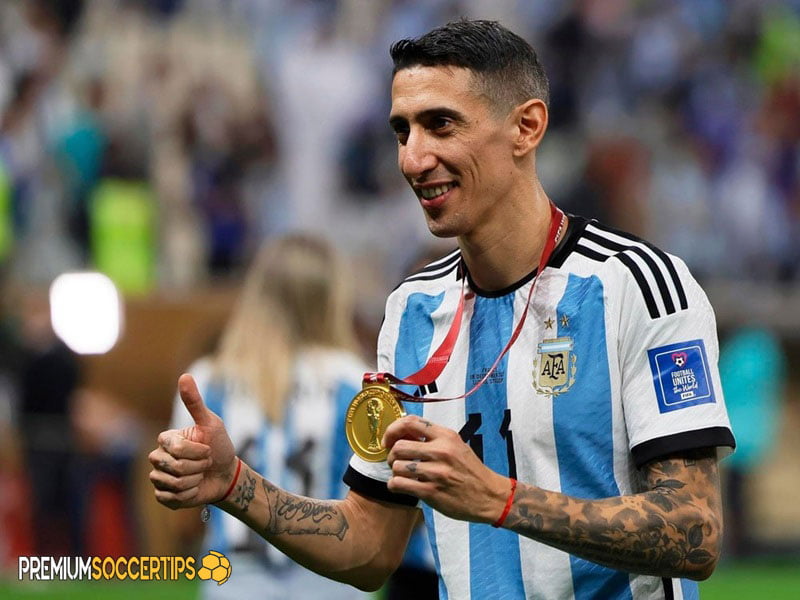
Di María began his career with Rosario Central before spending 3 seasons with Benfica and 5 seasons with Real Madrid, winning national titles and 2 domestic cups with both, and the 2014 Champions League with Real Madrid. After a season with Manchester United, he garnered 5 league titles and 9 domestic cups in 7 seasons with Paris Saint-Germain.
Following a year at Juventus, he returned to Benfica in 2023. On the international stage, Di María won the 2021 Copa América, scoring the decisive goal in the final. He then clinched the 2022 World Cup, once again scoring in the final match.
9. Javier Zanetti
Javier Zanetti is one of the most complete footballers of all time (watch video). He could play anywhere in defense or midfield, blending speed, strength, and endurance with dribbling, passing, and goal-scoring instincts. His most common position was right-back.
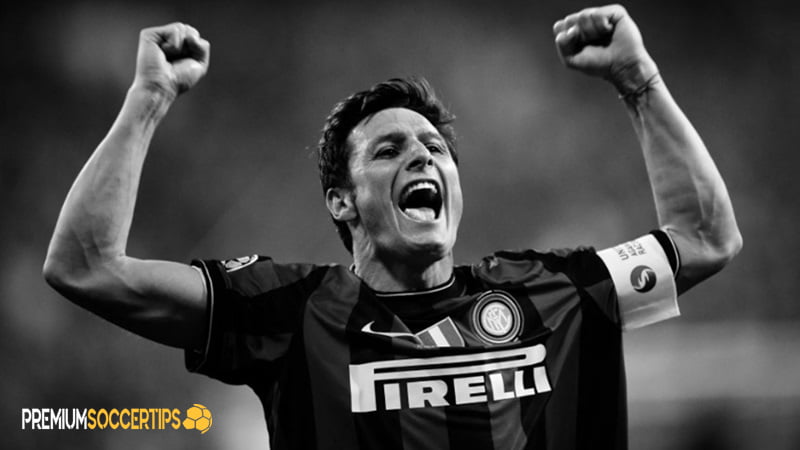
Zanetti had stints in Argentina with Talleres and Banfield before playing 19 seasons and making 858 appearances for Inter Milan (a club record). He won 16 titles there, including 5 league titles, 4 domestic cups, the 1998 UEFA Cup (Europa League), and the 2010 Champions League.
On the international stage, Zanetti had a less successful era. He had several runner-up medals, including Copa América in 2004 and 2007, and he never progressed beyond the World Cup quarter-finals.
8. Omar Sívori
Omar Sívori was the “Maradona of the sixties” and possessed an equally eccentric temperament. He also had remarkable dribbling skills (particularly the “nutmeg” skill), creativity, speed, and finishing ability, earning him the 1961 Ballon d’Or.
Sívori began his career with River Plate and won 3 titles in 3 seasons. He then moved to Italy and won 3 league titles and 3 domestic cups in 8 seasons with Juventus, scoring 168 goals. He finished his career with 4 seasons at Napoli.
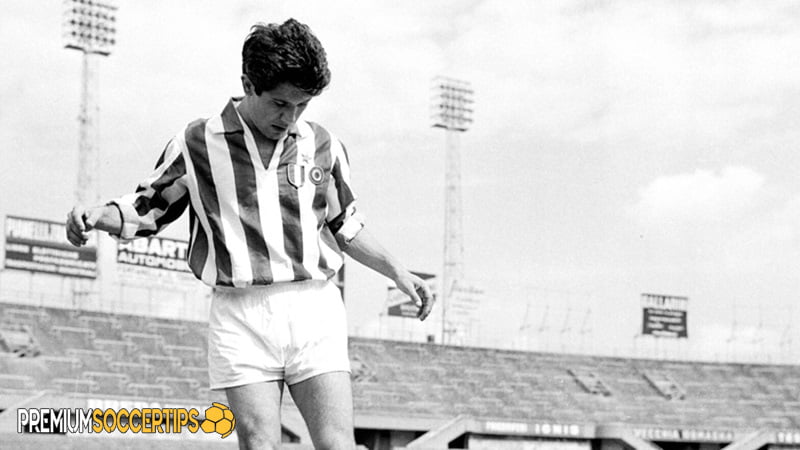
Sívori’s international career was less successful. He played 19 times for Argentina but was banned from the 1958 World Cup for playing for an Italian club. Sívori eventually declared for Italy but only featured in the unsuccessful 1962 tournament.
7. Ubaldo Fillol
Nicknamed “Duck” (or “el Pato” in Spanish), Ubaldo Fillol was the goalkeeper when Argentina won the 1978 World Cup. He was included in the tournament’s “All-Star Team“. A year prior, he was Argentina’s “Player of the Year” and is often regarded as the greatest goalkeeper the country has ever produced.
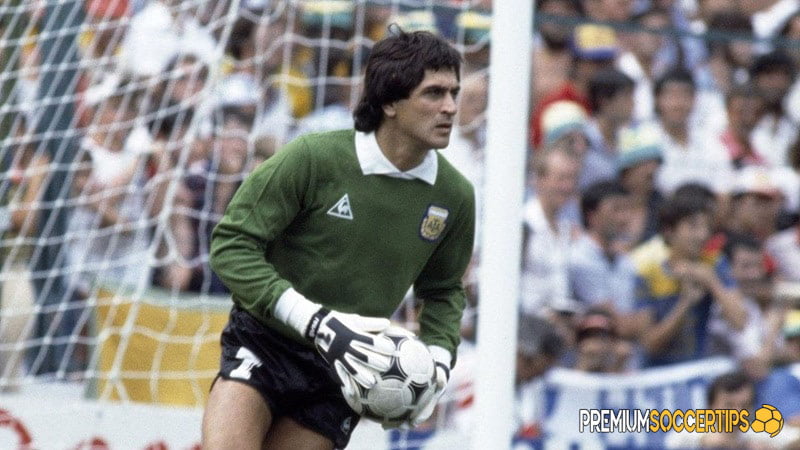
Fillol played for several Argentine clubs and also had spells with Flamengo (Brazil) and Atlético Madrid (Spain). However, he is best known for his 10-year tenure with River Plate, where he won 7 league titles.
Fillol appeared in 3 World Cup editions (1974, 1978, and 1982). He conceded just 4 goals in 7 matches during the undefeated 1978 campaign. Fillol was renowned throughout his career for his penalty-saving abilities and acrobatic saves.
6. Gabriel Batistuta
Gabriel Batistuta is one of the most underrated forwards. He was his era’s Harry Kane, with powerful and accurate strikes. Dubbed “Batigol,” his size, strength, and determination made him a force in Italian football, particularly during his successful years at Fiorentina, where he became their all-time leading scorer and won a domestic cup.
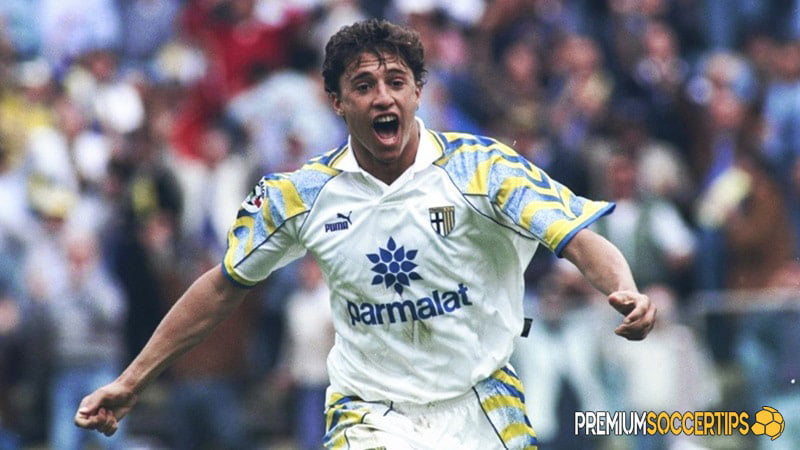
Batistuta began his career in Argentina with Newell’s Old Boys under the guidance of legendary coach Marcelo Bielsa. He ended it with Roma and a brief stint in Qatar. It was at Roma where he finally won the Italian Serie A title.
On the international stage, Batistuta excelled, winning the Copa América in 1991 and 1993, becoming Argentina’s all-time leading scorer (until surpassed by Lionel Messi). Despite scoring 10 goals in World Cup tournaments, his best achievement was reaching the quarter-finals in 1998.
5. Daniel Passarella
Daniel Passarella is the only Argentine player to have been part of two World Cup-winning squads, although he didn’t play in 1986 due to illness. In 1978, “El Gran Capitan” was the captain and also made the All-Star Team.
Passarella is the second-highest-scoring defender of all time after Ronald Koeman. Like Koeman, he was a proficient free-kick taker. Despite being only 1.73 m (5 ft 8 in) tall, he scored goals with his head and was very strong in aerial duels.
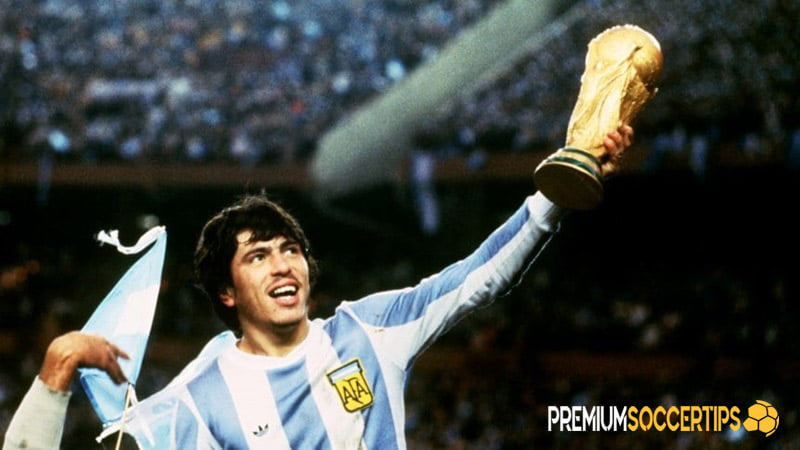
Passarella began his club career at Sarmiento before winning 7 league titles in 8 seasons with River Plate. He spent his later years in Italy (4 at Fiorentina; 2 at Inter Milan). Passarella was honored as Argentina’s Footballer of the Year in 1976.
4. Mario Kempes
Mario Kempes is perhaps the archetype for Batistuta’s heavy-metal hairstyle. When Argentina won the 1978 World Cup, Kempes claimed the Golden Ball (best player) and the Golden Boot (top scorer), scoring two goals in the final match. He also won the Golden Ball that year.
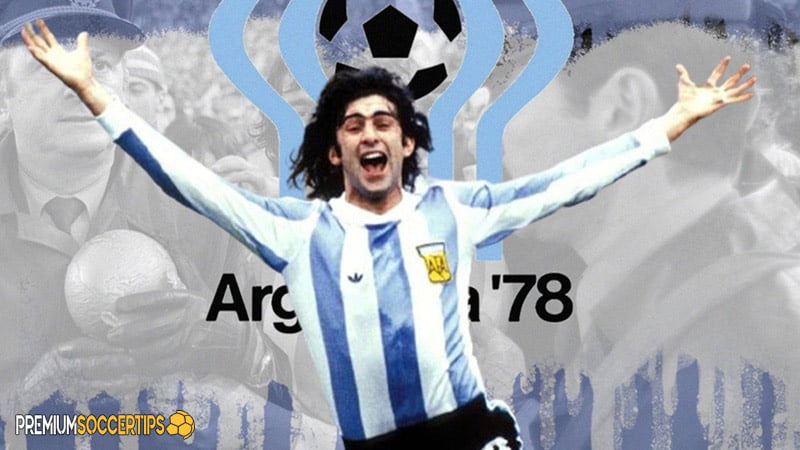
Kempes began his career with Instituto and Rosario Central before enjoying his finest years in Spain with Valencia, winning a domestic cup and the European Cup Winners’ Cup in 1980. He also played for River Plate, winning a league title, and had stints in Austria, Chile, and Indonesia.
Kempes is a prolific goal scorer with 149 goals in 246 appearances for Valencia. He worked tirelessly and often dropped deep into midfield to build up play. He combined power, skill, and movement to deceive defenders and create openings.
3. Alfredo Di Stefano
Alfredo Di Stefano is a Real Madrid legend, having won the European Cup (now UEFA Champions League) five times in a row (1956–1960; scoring in each final) as well as 8 Spanish league titles and a domestic cup. He is considered one of the greatest players of all time and won the Ballon d’Or in 1957 and 1959.
Di Stefano began his career with River Plate, winning 2 league titles. He then moved to Millonarios in Colombia, winning 3 league titles and a domestic cup. Eleven seasons at Real Madrid followed two seasons with Espanyol.
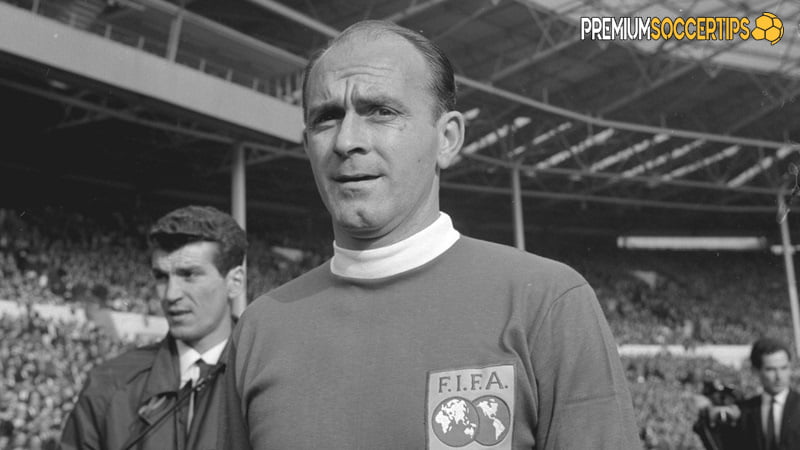
Although he scored 6 goals in 6 matches for Argentina, various disputes hindered Di Stefano’s international career. Eager to play, he registered to play for Colombia, then moved to Spain (after naturalization) but didn’t qualify for the 1958 World Cup. Di Stefano helped Spain qualify for the 1962 edition, but he was nearly 36 years old and suffered an injury.
2. Diego Maradona
Diego Maradona is often considered one of the greatest players of all time. His dribbling, ball control, and finishing abilities are widely recognized. His passing, vision, and creativity are less celebrated. He won the 1986 World Cup almost single-handedly, scoring one of the greatest goals ever and won the Golden Ball in 1986 and 1990.
Maradona was deemed too young to play in the 1978 World Cup (which Argentina won), and he was expelled from the tournament in 1982. In 1990, he reached the final but was defeated by Germany.
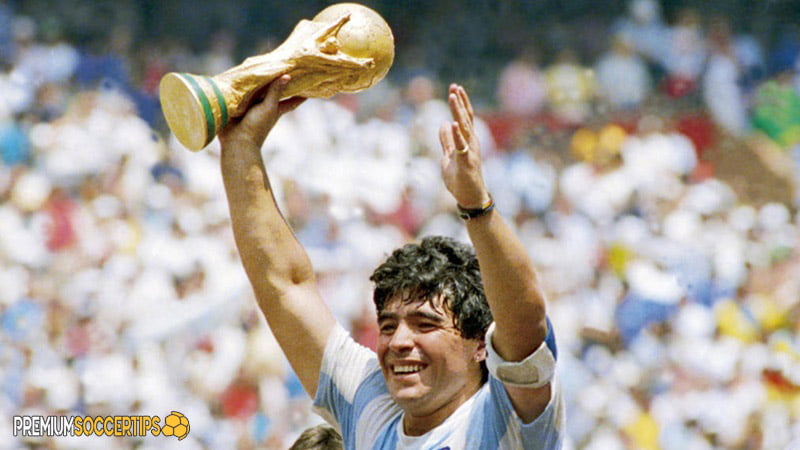
Maradona’s career began with 5 years at Argentinos Juniors before a year at Boca Juniors (winning the domestic league). Next came two seasons in Spain with Barcelona, including a domestic cup title. Maradona enjoyed his prime years with Napoli, winning 2 league titles, a domestic cup, and the UEFA Cup (Europa League).
1. Lionel Messi
Currently at Inter Miami, Lionel Messi is a prodigy from Argentina’s Newell’s Old Boys club. He was recruited by Barcelona at age 13 and made his debut at 17. He won 10 league titles, 7 domestic cups, and 4 Champions League titles in Spain. His 40 honors also include two titles with Paris Saint-Germain.
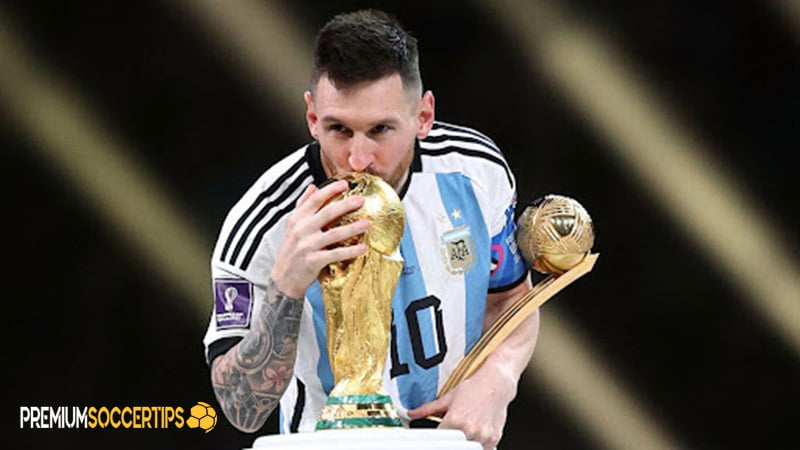
Messi has won 7 Ballon d’Ors (a record) thanks to his incredible goal-scoring ability, including over 40 goals in 10 consecutive seasons, over 800 career goals, over 100 goals for Argentina, and 13 World Cup goals (a national record). He won the 2022 World Cup and the 2021 Copa América. He’s the only player to win the Golden Ball twice (Best Player of the World Cup; in 2014 and 2022).
Messi is also renowned for his quick feet, acceleration, and dribbling ability past multiple defenders en route to the goal. Apart from his stunning free-kick ability, he can also assist teammates and navigate through the toughest defenses.
Conclude
Argentina has undeniably produced some of the most iconic footballers in history, showcasing a blend of skill, passion, and sheer determination on the pitch. From the legendary Mario Kempes, who led Argentina to World Cup glory in 1978, to the incomparable talents of Alfredo Di Stefano, Diego Maradona, and Lionel Messi, the country has consistently delivered players of extraordinary caliber. Their exploits, both domestically and internationally, have not only brought countless trophies and accolades but have also captivated the hearts of football fans worldwide. Argentina’s footballing heritage is a testament to the enduring legacy of these remarkable individuals, whose contributions continue to inspire and resonate across generations.
See more: Top 10 shortest football player in the world right now








